My Time At Town - Phil Brown: “It was more of a brotherhood than a football team”
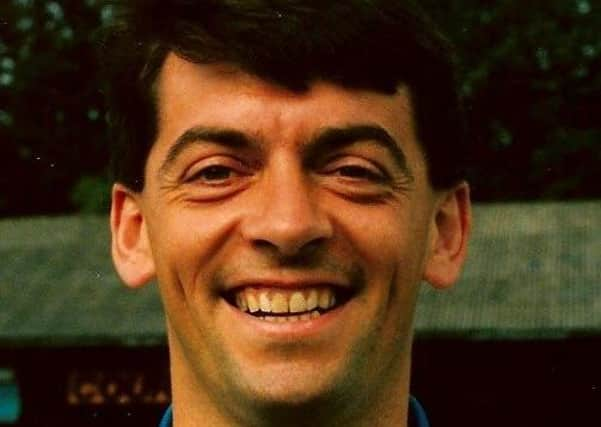

Brown was an apprentice electrician before playing for Hartlepool, where seven seasons of almost constant struggle were useful preparation for life at The Shay.
“Mick Jones and Billy Ayre swayed it for me,” Brown says of his decision to join Halifax in 1985. “I knew Billy very, very well, I played with him at Hartlepool, and made my debut alongside him.
Advertisement
Hide AdAdvertisement
Hide Ad“He was going into the managerial side of his career at Halifax under Mick.
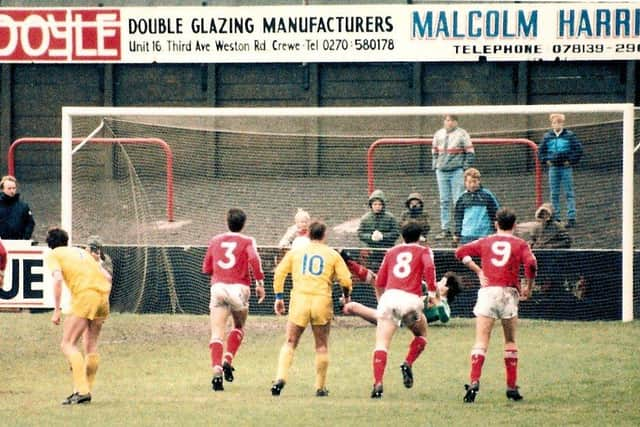

“I knew from coming up against him just how competitive he was. He was a real tough character that I looked forward to working with.
“As a partnership, talk about no-nonsense, my word. But there was a bit of thought behind it.
“Mick served some time under Brian Clough so he was going down that line of the psychology and man-management.
Advertisement
Hide AdAdvertisement
Hide Ad“Billy was just a man’s man, led by example, and you got on with it because if you didn’t you were frightened.”
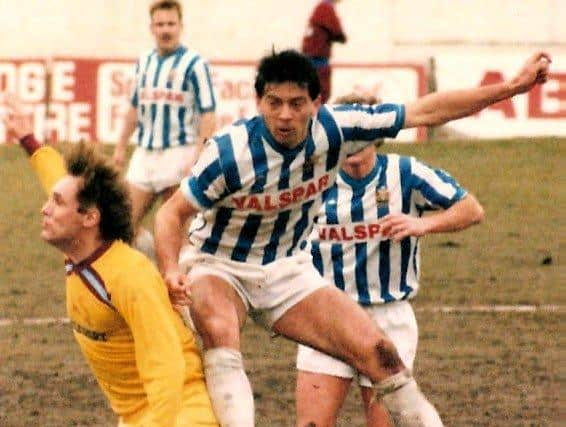

Bad cop and bad cop?
”Oh absolutely,” says Brown. “To be fair to Bill, he was a very intelligent man.
“That’s not to say Mick wasn’t, but Mick was football intelligent, very streetwise when it came to crossing the white line.
“Billy was streetwise full stop, one of these guys that could smell danger, sense when a rat was round the corner. He could go into a changing room and dig out somebody as early as he possibly could because he didn’t like them or they didn’t agree with what he was trying to do.
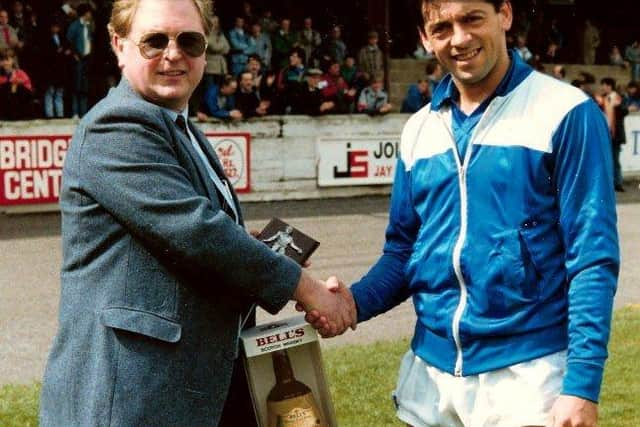

Advertisement
Hide AdAdvertisement
Hide Ad“As a partnership I thought they were brilliant, absolutely made for each other.”
The mutual respect between Brown and Town’s management team extended to the new recruit being made captain upon his arrival.
“I think Mick and Billy had recognised that there was a leader in me early on in my career.
“I was 22, 23 when I was first starting becoming captain at Hartlepool. I’ve always been proud of being captain of any football club, and I went from 22, 23 right the way through to a 37, 38-year-old before anybody took the captaincy away from me.
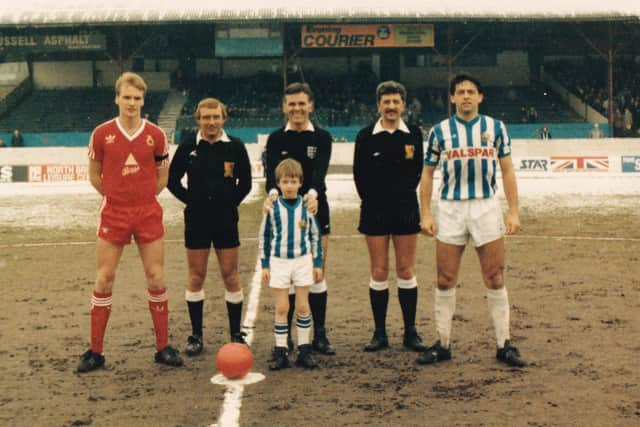

Advertisement
Hide AdAdvertisement
Hide Ad“A lot of people are blessed with great talent in football but I wasn’t one of them - I think what I was blessed with was a heart.
“I went into every game thinking I had a fighting chance of winning that game, and I tried to impress that upon my team-mates.”
Brown lived in Cleckheaton with team-mate Ces Podd before moving to Ripponden.
“Ces was the right-back I came to replace at The Shay because he was getting older,” says Brown. “He’d have been 33, 34 at the time.
Advertisement
Hide AdAdvertisement
Hide Ad“He was a right-back of great stature and unbelievable history at Bradford City. He was coming to the end of his career and I’m the young gun waiting to take him down and step into his shoes.”
Brown admits he was fascinated by recent TV series Gentleman Jack, set in Halifax, and looked out for filming locations he might recognise.
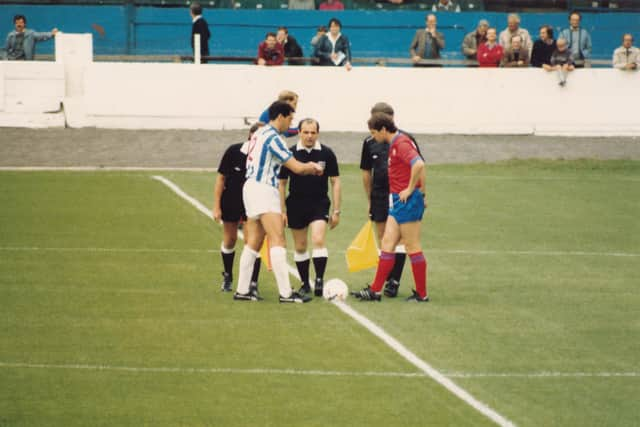

It’s the same enthusiasm that gripped him when he first joined Halifax 35 years ago.
“It was literally my first move away from the north-east, I had to cut the family strings from my mother and father,” he says.
“My first impression of Halifax was that it was modern day.
Advertisement
Hide AdAdvertisement
Hide Ad“I went out for Sunday lunch with my team-mates one early Sunday, walked into a pub fully expecting to get a full Sunday roast, and they were serving lasagna, and I’m like ‘wow, lasagna on a Sunday’.
“I just couldn’t believe it.
“My wife at the time wasn’t prepared to move, my son was newly born and it was difficult for us.
“But the Friday night games at The Shay were fantastic for me because I could jump in my car and be back up home maybe in time to catch the last pint at the local pub, or if not, you knew you’d got a full weekend with your family.
“I shared the workload with regards to travel with two lads called Dave Longhurst and Adie Shaw, who we got from Notts Forest and lived about 10 miles from South Shields.
Advertisement
Hide AdAdvertisement
Hide Ad“That became a bit of a problem when we had Saturday games and I couldn’t go home, so sometimes you were two, three, four weeks from seeing your family, which isn’t easy.”
Brown only spent one season under Jones and Ayre as a duo - with Ayre taking over as manager when Jones left in 1986 - but it was enough to light the fire of management inside the Town skipper.
“My first insight into football management - would I fancy being a manager one day - was watching these two guys work and listening to everything they had to say,” Brown says.
“They were obviously driven, they were very old school with regards to their approach, but they were attempting to do things maybe Brian Clough was doing at the top level, and maybe you couldn’t do that (at Halifax’s level).
Advertisement
Hide AdAdvertisement
Hide Ad“So when I witnessed those things they stuck in my mind, and I started having a look at that side of it.
“Then you start looking at the finances and you realise there’s a lot of league position attached to finances.
“I knew the guy in charge, John Crowther, very well. I think there was a seven-man board, and I don’t know what kind of money each man put in, but whenever there was a shortfall, somebody was called to dig into his pockets.
“John ran a printing business, so I wouldn’t have you were talking about a multi-millionaire, but he had a passion for football.
Advertisement
Hide AdAdvertisement
Hide Ad“The pockets weren’t always that deep and to make ends meet, sometimes you had to beg, borrow and steal.
“We struggled from a financial point of view. Signing the likes of Davie Longhurst and Adie Shaw showed you what market we were in, because they were youth team players at Notts Forest and were getting introduced to the real world of football at Halifax Town.
“That lack of experience stood in our way a little bit, but there were some experienced players to guide us through like Paddy Roche and Barry Gallahger.
“When I think of the spine of the team we had kids in there like Stevie Thornber, Alan Knill and Micky Galloway.
Advertisement
Hide AdAdvertisement
Hide Ad“There’s a lot to be said for where we finished in the league table being because of the finances.”
Such constraints were a huge factor in putting promotion well out of reach, but fostered a strong team-spirit among the squad, Brown says.
“Sometimes you find it hard to believe that you’re getting up out of bed in a morning and you’re not sure if you’re going to get paid to put food on the table to feed your family.
“You’re going out to work and how do you motivate yourself to play football with 10 other blokes and try to win a game of football for some people who are not paying you?
Advertisement
Hide AdAdvertisement
Hide Ad“All of that brought a tightness. Nowadays it’s part and parcel of the game that you get fed by the clubs but I think we were one of the early clubs that started that.
“We didn’t have any of that so we decided to do it ourselves. ‘Right, fiver a head everybody’ and we went to the local pub or restaurant or cafe, and got ourselves physically and mentally ready for afternoon sessions, because we were fed.
“If you couldn’t afford it someone would chip in and say ‘doesn’t matter, I’ll get that’.
“It really did bring us all together, it got you talking, discussing things outside football, got you to understanding who you were playing alongside a lot more than we probably would have done if it had been put on for us.”
Advertisement
Hide AdAdvertisement
Hide AdDespite the financial hardship, Town’s finishes of 20th, 15th and 18th in his three seasons at The Shay represent underachievement in Brown’s opinion.
“When I look at the players that came and went, I thought we had some really good players, who went on to do OK,” he says.
“Stevie Thornber sent me a WhatsApp message the other week, Adie Shaw still keeps in touch. It was more of a brotherhood than a football team.
“I think we all knew we were transient, we all knew that if anybody round the corner came in - a Huddersfield, a Leeds United or a Bradford, on the doorstep - that we would go. It was a selling club more than anything else, for one reason only, in that it was struggling financially.
Advertisement
Hide AdAdvertisement
Hide Ad“You couldn’t survive on 1,500, 2,000 crowds, impossible, with that many big teams in the area as well.
“All of these things were deciding factors where you were going to end up.
“What has to go alongside that is a lack of ambition to a certain extent. If the club itself weren’t ambitious enough to invest another x amount of thousands of pounds to try and get you to the top, then it went hand-in-hand.
“For me, it was one of my greatest apprenticeships, and my career started in earnest when I left Halifax and went to Bolton.”
Advertisement
Hide AdAdvertisement
Hide AdBrown ended the 1986-87 season as Town’s top scorer with 12 goals, and netted 21 in 165 games for the club.
“I took great pleasure in scoring goals,” he says. “Every finishing session I was at the head of it.
“I went up for every corner, every free-kick, I used to get forward a lot and I think I went from scoring 12 (that season) at Halifax to doing well at Bolton and scoring as many if not more at Bolton.
“I’d be winding the strikers up at the club no end as the highest goalscorer!”
Advertisement
Hide AdAdvertisement
Hide AdIn his final season, Brown became the first Halifax Town player to be voted into the PFA Fourth Division side at right-back, and was voted Player of the Year by the club’s supporters.
“We went down to the (PFA) function when I got into the team (of the year), we had a table of 10, all players,” says Brown.
“Then all of a sudden three or four of the board members decided to start getting interested and we filled two tables up, just because Halifax Town had a representative in the PFA team of the year.
“We all went down - you never forget those days. Covent Garden on a Sunday afternoon, going from lasagna on a Sunday afternoon to Covent Garden. That’s going to the next level!
Advertisement
Hide AdAdvertisement
Hide Ad“Fantastic memories and I felt like I was doing the club a big favour in promoting what is possible.”
But such form inevitably attracted interest from other clubs, and Brown’s most memorable games during his time at Halifax are also what led to his departure from The Shay.
“It was a three game header against Bolton in the FA Cup. Phil Neal was playing left-back and I was playing right-back,” he says.”I was an attacking full-back to say the least and I just kept going past him.
“It eventually got me a move there. I think we drew at The Shay, played at Burnden Park, then came back to The Shay and got beat.
Advertisement
Hide AdAdvertisement
Hide Ad“But the highlight for me was the camaraderie. It taught me all about what you can achieve with a group of nomads, probably what a lot of people would class as no-hopers, and a team that was always selling to make ends meet.
“It brought us together, and it was about the changing room. I’ll never forget the characters I played alongside - little Steve Ward took me under his wing when I first moved to the area.
“He moved after a year or so but I’m still in touch with him.
“Great memories, great days. It was my first foray into the world outside the north east, my first step into the cosmopolitan world.”
Thanks to Johnny Meynell for his help with this article.
Advertisement
Hide AdAdvertisement
Hide AdA message from the Editor: Thank you for reading this story on our website. While I have your attention, I also have an important request to make of you. In order for us to continue to provide high quality and trusted local news on this free-to-read site, I am asking you to also please purchase a copy of our newspaper. Our journalists are highly trained and our content is independently regulated by IPSO to some of the most rigorous standards in the world. But being your eyes and ears comes at a price. So we need your support more than ever to buy our newspapers during this crisis. With the coronavirus lockdown having a major impact on many of our local valued advertisers - and consequently the advertising that we receive - we are more reliant than ever on you helping us to provide you with news and information by buying a copy of our newspaper. Thank you
Comment Guidelines
National World encourages reader discussion on our stories. User feedback, insights and back-and-forth exchanges add a rich layer of context to reporting. Please review our Community Guidelines before commenting.